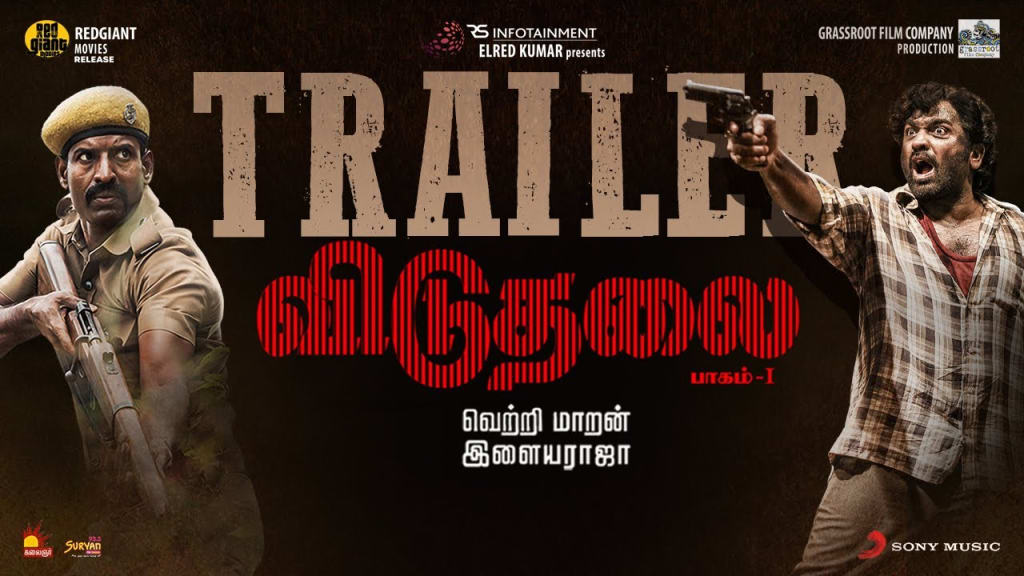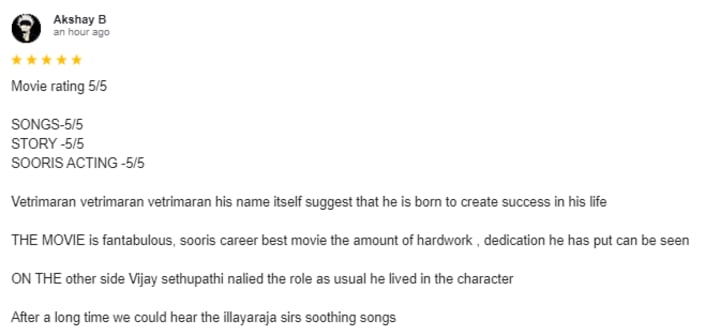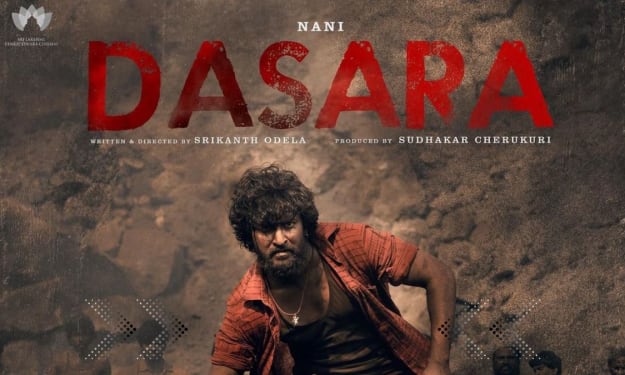The first review of "Viduthalai" by Vetrimaaran is out!
Vetrimaaran's Power

The first review of "Viduthalai" by Vetrimaaran is out!
The film "Viduthalai," directed by Vetrimaaran, is based on Jeyamohan's novel Thooyavan. The movie will be released in two parts, and the first one will open in theaters tomorrow, March 31. Soori, Bhavani Sre, and Vijay Sethupathi play the main characters in the socio-political drama. Ilaiyaraaja is the mastermind behind the film's music, and the composer has created energizing songs to get people excited about the movie.
Interestingly, the film's initial review has been released. The co-producer of the production house run by Udhayanidhi Stalin took to social media; which is also distributing the film throughout Tamil Nadu has stated that the film will set records. "Watched Director #Vetrimaaran's #Viduthalai Part1, it's an amazing experience," he wrote in a tweet. This movie will set new records.
The second part of the movie will be released in September 2023, despite the fact that all of the filming has been completed. In addition, important roles are played by Gautham Vasudev Menon and Rajiv Menon in the film.
The censor board gave the film an "A" rating because it uses a lot of bad language. The much-anticipated film will undoubtedly arrive on the date that has been announced, and reservations for the first three days appear to be solid. However, director Vetrimaaran is making his last-minute adjustments, leading us to speculate that he may resend the film for censorship in order to clear it under U/A.Viduthalai - Section 1 is set in 1987, and it is based, freely, on a Jeyamohan brief tale. It's primarily a tale about the underdog. Vijay Sethupathi, who makes a kind of cameo appearance here and will be seen more in Part 2, is the big name on the cast. However, this is about the story of Kumaresan, a new cop played by Soori. Vetrimaaran's greatest achievement was discovering qualities in Soori that no one else had noticed in the actor's nearly two decades of existence. Vetrimaaran sees the actor's goodness, innocence, helplessness, lack of confidence, and desperateness, as well as the actor's internal moral code. For instance, Kumaresan is not someone who will say "sorry" to a superior in order to evade punishment, particularly if he is aware that he has not committed any wrongdoing.) By internalizing the director's writing and giving an extremely convincing performance, Soori satisfies Vetrimaaran's instincts. He doesn't appear to be "acting" most of the time. He simply is. His Kumaresan turns into our eyes and ears, since like him (at first), we are untouchables to this world.

Viduthalai - Part 1 is loosely based on a Jeyamohan short story and takes place in 1987. It's primarily a tale about the underdog. The enormous name in the cast is Vijay Sethupathi (he does a sort of appearance here, and he will be seen more To some degree 2), however this is about the circular segment of the Soori character, a novice cop named Kumaresan. Vetrimaaran's most prominent victory is seeing in Soori characteristics that no other person saw for the 25-odd years the entertainer has been near. Vetrimaaran sees the actor's goodness, innocence, helplessness, lack of confidence, and desperateness, as well as the actor's internal moral code. For instance, Kumaresan is not someone who will say "sorry" to a superior in order to evade punishment, particularly if he is aware that he has not committed any wrongdoing.) By internalizing the director's writing and giving an extremely convincing performance, Soori satisfies Vetrimaaran's instincts. He doesn't appear to be "acting" most of the time. He simply is. Because we are initially outsiders like him, his Kumaresan becomes our eyes and ears.
So, what exactly is the world? It is a specific location in the southern hills of Tamil Nadu. However, it is also a microcosm of the state, which promotes "development" and invites megacorporations to invest in mining infrastructure, for example. The film does not address the complicated question of whether all development is incorrect. Part 1 of Viduthalai operates on a fairly straightforward good-versus-bad level. The special task force formed by the police to capture the leaders of the rebel group Makkal Padai are the "bad guys." The good guys are these guys. Because of the cost to the local population and ecosystem, they use violent means to oppose the government's plans for development. Contingent upon who's communicating everything, the individuals from Makkal Padai are Naxalites or progressives or psychological oppressors. Note the name of the outfit's chief, the Vijay Sethupathi character. The word "Perumal" means "God." Nobody has seen him, but he's all over the place, arranging everything. It's a good name.
How does one become an insider from outside? How does an honest increase shrewdness? How can one learn to distinguish between loose talk propagated by the media and propaganda propagated by the state? To put it another way, how can you tell the genuine "good guys" from the genuine "bad guys"? And lastly, how does a man who initially feared guns end up with one? Which is: What makes a "coward" a hero? These are the issues driving Viduthalai - and the manner in which they shape Kumaresan is the general bend of the transitioning story. We are introduced to his mental state through his voice-over letters to his mother, and almost everyone in his immediate environment—good and bad, pure and corrupt—takes on the role of teacher or "vaathiyar." This, incidentally, is likewise a term of regard utilized for the Vijay Sethupathi character.)
Even Kumaresan's love interest, played by Bhavani Sre as Paapa, teaches him that you should trust people based on what they are on the inside, not what they look like on the outside. I wished that Kumaresan's realization moment had been incorporated into the rest of the love track because it is so wonderful. Excellent is how Paapa and Kumaresan meet. It's incidental. It demonstrates the cruel world we live in, both toward animals and eventually humans. However, the rest of this love story doesn't go as deep because it's supported by two unnecessary Ilayaraja songs. The song stretches have the impression of appearing in any movie or love story. We don't really get a sense of how intense this relationship is, which is important to the climax, which cuts between scenes of Paapa and Kumaresan.
Viduthalai is an admirable and watchable film. At this point, Vetrimaaran cannot produce anything that isn't interesting on some level. However, despite the gritty subject matter, I could not help but think of Visaranai, a truly outstanding film. Why doesn't Viduthalai become as great as that? First, the film seems to be edited too tightly. The scenes lack life. For example, there is a piece where a high school Timetable Position young lady is killed. It doesn't have as much of an impact as the description of the scene suggests. But the top of the food chain and Kumaresan, the cops are a genuinely unknown pack. And even when we get a technical feat that blows our minds, like the long, one-shot coverage of a train accident, we are more impressed by the shot than we are by the people who were hurt. A drone shot that begins with two men in a forest is the best piece of cinematography in the movie. The camera keeps moving up until the two men seem like tiny insects in comparison to the vastness of nature—the very nature Perumal is working to protect from human greed.)
And because of this rush, we don't get any sociopolitical information that we already know about, information that could make us rethink this story about police officers who will use the most horrible means to get to their goal (capturing Perumal). As a senior police officer, Gautham Vasudev Menon appears in a well-written role alongside Rajiv Menon and Chethan. Where does he go from being a sympathetic man who seems to resent women being stripped to someone who pulls fingernails out to get information? The proceedings could have been richer with these brief graphs. We also don't get the sustained sense of dread that kept Visaranai together due to the brisk pace. In a way that we have never felt for Kumaresan, we feared and felt for those innocent people.) Asuran is more like Viduthalai. In contrast to Asuran, there are no emotional highs in this mainstream movie, which is straightforward and trite. It also has a short storyline.
The proceedings are further harmed by Ilayaraja's score, which emphasizes and sentimentalizes each emotion. During the location of that train mishap, for example, the music continues to battle with the surrounding sounds (both exchange and "climate") for consideration. A Vada Chennai or an Aadukalam can utilize - and be improved - by this sentimentalisation, by these melodies. However, the Visaranai/Viduthalai region is distinct, and I find it odd that our filmmakers claim that they send their films to festivals without much of a score but add it for local release "for the sake of the audience." This has occurred with numerous other "new-age" films, including Kaaka Muttai.) Should we not also have faith that our audiences will accept our films without being emotionally manipulated if we are going to make films that alter the way audiences (our audiences) perceive cinema? A side note: in my PS-1 review, I wrote: Could the songs by AR Rahman have been completely removed to make room for more narrative? It's a point of rhetoric. Although I am aware of the significance of music to the business of film, if you have a lengthy narrative with numerous characters, wouldn't you prefer to devote more time to fleshing it out? Of course, it depends on personal preference, but I also think it's important to consider.
On the other hand, this "mainstreaming" might be what enables Viduthalai to reach a larger audience than Visaranai did. I wished we had spent more time inside Kumaresan's head because this is mostly about him growing up. However, the entirety of Part 1 serves as a prelude to Part 2, and the version I watched a few days prior to its release has an epilogue in which each and every line and moment is a fireworks display. Viduthalai has yet another interesting fact. The two-parter films that have been shown in India (or perhaps even the world) up until this point have all been in the fantasy/history genre. It's possible that this is the first time a sociopolitical film has been shown in two parts. We won't be able to assess Viduthalai's full impact until we see the second part, but for now, we have a film with good intentions that feels like it needs to go much deeper.
About the Creator
Mohamed Azharudeen
As a writer, I weave words into stories, crafting worlds to captivate readers and evoke emotions that linger long after the last page.






Comments
There are no comments for this story
Be the first to respond and start the conversation.